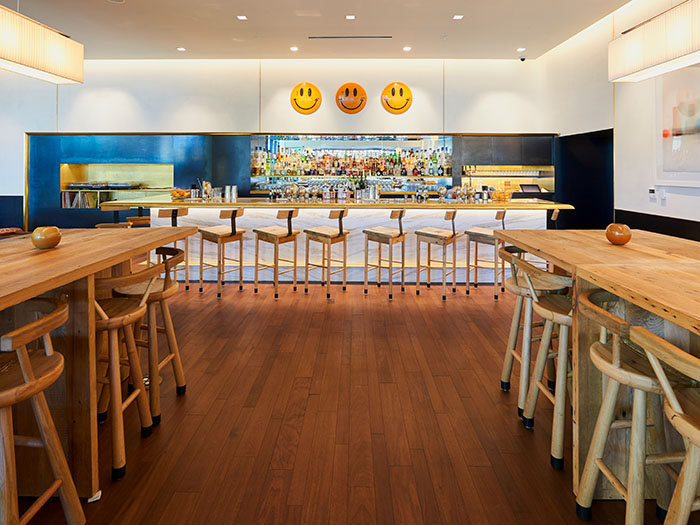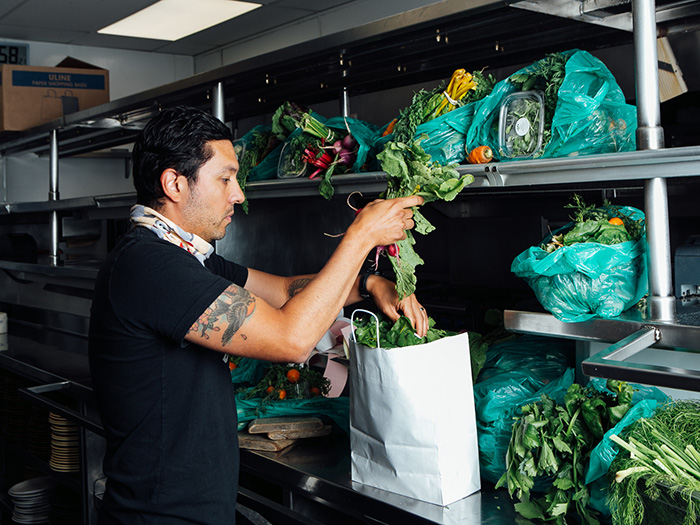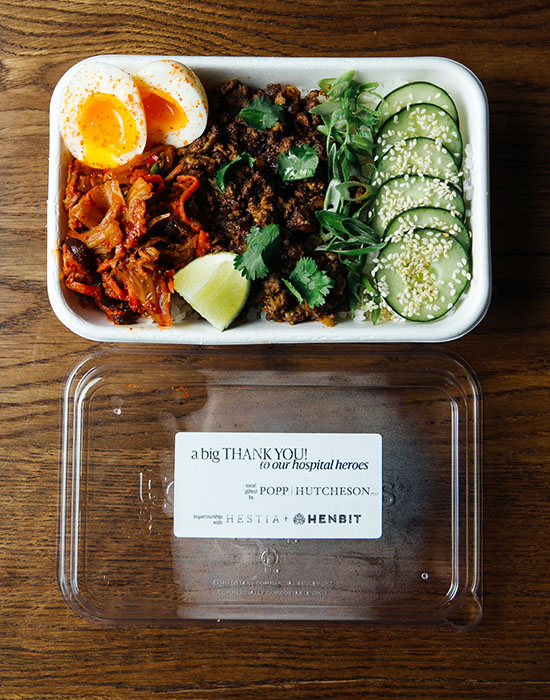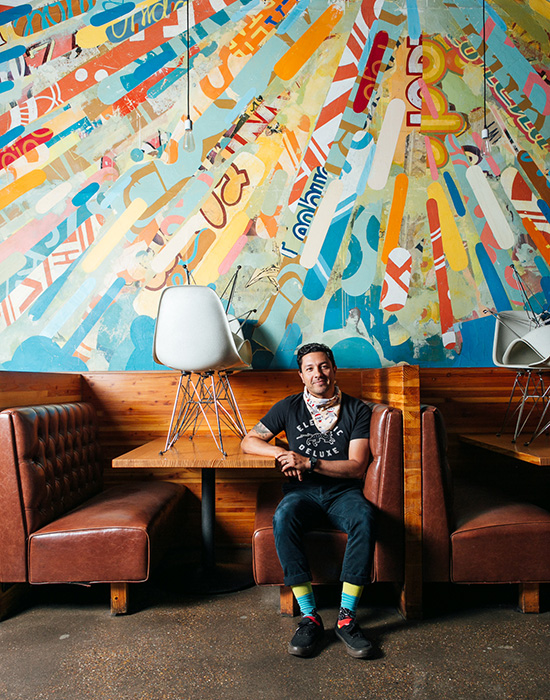Austin Restaurants Face Coronavirus Crisis with Innovation, Determination, Service

This story was researched and written in early May and updated as we went to press. Given the fluid nature of the pandemic, some circumstances have likely changed, but we’ve done our best to provide accurate information.
On the evening of March 15, executive chef Kevin Fink and pastry chef Tavel Bristol-Joseph shared a bottle of wine on the back patio of Lolo, a new wine bar and bottle shop in East Austin. With South by Southwest canceled and “social distancing” suddenly part of the national lexicon, the week had been alarmingly slow for Austin restaurants. Owners of five downtown hot spots, including Hestia and Emmer & Rye, Fink and Bristol-Joseph had come to Lolo to offer solidarity.
The occasion should have been celebratory: Bristol-Joseph had just been named one of Food & Wine’s Best New Chefs, and Fink—a 2016 Best New Chef—had recently earned a James Beard nomination for Best Chef: Texas.

Just after six o’clock, Fink’s phone vibrated: A text from a colleague informed him that Olamaie had furloughed all hourly staff, shuttering for at least six weeks. As the first food and drink business to close in response to rising coronavirus concerns, Olamaie’s chef-owner Michael Fojtasek’s (also a 2020 Beard nominee) decision enabled his team to file for unemployment benefits before a record surge of applications would inundate the Texas Workforce Commission.
Before the night ended, another beloved Austin restaurant and butcher shop, Dai Due, followed suit and closed its dining room. Two days later, a city mandate would order the closure of all food and beverage operations. The Olamaie news was pivotal, but Fink and Bristol-Joseph had already seen the writing on the wall, gathering their team of 150 on March 14 to prepare for potential layoffs.
“It’s important to be transparent with people in a crisis,” says Fink.

For the Emmer partners—which also include Fink’s wife, Alicynn, and Rand Egbert—who regard their staff and network of regional farmers as family, the only way through was forward. With the help of 30 salaried employees, they launched curbside takeout and delivery options at both Emmer & Rye and Hestia, including locally sourced produce, dry goods, wine and seasonal cocktail kits. The temporary venture enabled the restaurants to provide 10 percent of all Hestia sales and ongoing health coverage for their furloughed staff, while gift cards went toward an employee emergency fund to supplement unemployment benefits. The group also launched a subscription cooking channel with a donation link for the emergency fund and provided staff with grocery bags of raw and prepared items once a week.
“It’s helping them eat healthy food and keeping them out of supermarkets,” says Fink. “We’re doing as much as we can as small-business owners.”
Other restaurants were also able to pivot from fine and casual dining to delivery and takeout, some selling house-made prepared foods, groceries and alcoholic beverages. Behind the scenes, the operational change meant not only purchasing to-go packaging and signage, but implementing more rigid sanitation procedures, no-touch ordering systems, significant website updates and the new logistics of COVID-19-safe pickup and delivery.

Not all bars and restaurants had the means to stay open—but shuttering required an equally complicated process of extensive paperwork, equipment breakdown, cleaning and security precautions to dissuade looting.
“The repercussions are felt in so many places besides our own staff,” says Paul Finn, beverage manager of Garage Cocktail Bar and Comedor. “When we closed, I had to cancel repairs and maintenance with plumbers, electricians and refrigeration technicians. Distributors, vendors, linen services, cleaning crews … when food and beverage shuts down, a lot of other industries are affected.”
Likewise, the locally owned and operated New Waterloo hospitality group felt the ramifications across all 15 of its properties, which include downtown staple La Condesa and South Congress Hotel.

“In just 24 hours, we went from thinking we could just scale back to realizing we needed to close everything immediately,” says director of marketing Alexis Lanman. “The ripple effect is inescapable and includes our PR teams, florist, the musicians who play First Thursday at the hotel, the local kombucha vendor, our sign painter. It hurts to be a part of it, but safety was paramount.”
Closing all restaurants on March 16, New Waterloo furloughed 550 employees to give them a jump on unemployment. The group was later able to reopen Sway in West Lake Hills and South Congress Hotel’s Café No Sé and Mañana for takeout and delivery, but its initial aim was creating immediate support for furloughed staff. In the first week of closures, New Waterloo’s restaurants provided free hot meals and grocery packages for employees. The group also extended health care benefits to full-time employees through April, while a digital telethon fundraiser secured more than more than $71,693 for emergency resources that went directly to employees.

“No one could have prepared for this,” says Lanman. “There’s no training or guidebook. We didn’t do everything perfectly, but we sure as hell tried to do the best we could by our teams.”
New Waterloo also received unforeseen support from fellow food partners, with ongoing donations from seafood supplier Minamoto Foods, Eden East Farm and nonprofit Urban Roots Austin.
“ gave us produce like fennel, onions, garlic, beets and greens for grocery bags,” says La Condesa executive chef Rick Lopez, who was forced to furlough his staff of 60. “This is in addition to helping other restaurants like Suerte and Launderette and maintaining their farmers market stand. Minamoto has been giving us up to 300 meals a day.”

In the face of enormous adversity, such spontaneous and selfless gestures wove a common thread through Austin’s food community this spring—often coming from unlikely sources.
“We’ve been met with a ton of grace, generosity and understanding, from our landlords being flexible with rent to vendors understanding when we had to pause services,” says Lanman.
Reciprocity created its own ripple effect, disrupting what often felt like a tidal wave of bad news. In mid-April, Hestia and Henbit launched an ongoing meal donation program in partnership with local benefactors, serving thousands of health care workers at Seton’s local medical centers. New Waterloo’s human resources and finance teams donated services to other small businesses, helping them navigate the unemployment process and small business loan applications.

“There’s been such authenticity in communication and joy in deep connection, and we’re figuring out the part we play in that,” says Lanman. “The resounding call to action is that we’re all in this together, and together is how we’ll figure it out.”
As Austin restaurants and bars take their first tentative steps toward this new existence, the surviving establishments have begun to open under unfamiliar constraints to an understandably skittish public. While no-touch service, dramatically reduced capacity and mask- and glove-attired servers may detract from the experience, the community bonds forged and strengthened during the crisis have given many in the food and beverage industry the ability—and enthusiasm—to endure.

“I’m excited and completely inspired to feed our community again,” says Lopez. “The best way to approach this next chapter is to embrace the change: pay attention to your neighbors and offer support on the local level, as these avenues have a direct impact on your quality of life. We all need to work for each other and provide positive vibes to get through.”
For others, the pandemic has revealed some hardcore truths about our domestic food system. As meat processing plants and food manufacturers are identified as COVID-19 clusters or otherwise forced to close, we’re literally paying the price for the resulting supply shortages, reinforcing what food security advocates like Jesse Griffiths of Dai Due have been saying for decades.

“When you really need food, the perceived high costs associated with fewer hands and short distances become more widely understood because there’s so much real value,” he says.
Along with the teams at Épicerie, Sour Duck and Salt & Time, Griffiths is one of few area restaurateurs who had the infrastructure and relationships in place to swiftly pivot to takeout and grocery. He hopes the crisis will only continue to prove the importance of frequenting food and drink establishments that support our local foodshed.

“The reasons for buying local are layered,” he says. “While you might not see immediate benefits, it’s the short supply chains that are the first mended.”
Implementing a localized business model may not be financially feasible for every bar and restaurant, but as we take the first faltering steps toward a post-pandemic existence, we can at least apply the principles we’ve learned from this collective experience: Namely, when we look out for one another, a brighter, kinder, more enduring and delicious future comes within reach.
